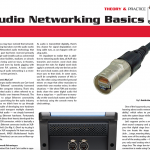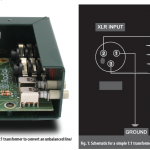Every so often, you hear of acquaintances getting swindled on a rental, or outright burglarized at the shop, or (more often) from the truck or trailer carrying sound reinforcement gear. Before you are the next one suffering such an incident, take reasonable steps to thwart attempts of thievery.
The Pro Thief
No matter what you may do, a real professional group of thieves will not be deterred by just about anything you do to protect your gear. And when I say professional, I am thinking of persons that plan the theft in detail, know what they are after, and have a ready buyer of the goods that will not care if all the gear serial numbers are broadcast amongst the soundcos. In this scenario, the gear will likely be headed out of the country on very fast transportation. The challenge is to thief-proof your soundco gear against the lesser thieves — the ones who will likely pawn your stuff to the first buyer in sight for cash and a quick getaway. These thieves are motivated typically by straight greed, stupidity and the occasional drug habit. To them, they just know your stuff makes a nice big stereo system until it is pawned or sold to a few desperate garage bands.
A Reality TV Check
The first thing you must consider when thinking about gear security is getting a reality check. We all get way too much cops and robbers television and start to believe that if we play the hero, all things will turn out alright. But I must shout these words, NO AMOUNT OF GEAR IS WORTH YOUR LIFE OR THE LIFE OF OTHER INNOCENTS! In other words, leave the guns at home, and keep your knives in your pocket, handy for cutting tape. Chances are, any robbers will be armed and will likely have much more weapons practice than you. And if robbed, your best defense is to be passive enough to keep your life and collect the best description of the persons and the transportation they used for law enforcement.
Record Keeping
If you have not done so yet, take the time and record all your gear statistics. If not for insurance purposes, then record the gear at least for inventory and security purposes. Things like a description, serial number, normal location when stored, present value at inventory date and replacement cost for an equivalent item. Even if you are a small time weekend warrior and think you have everything memorized, you would be shocked with the quantity of items to be replaced if your whole inventory disappeared. Of course, computers are great for archiving records, but make multiple copies and keep at least one copy in a separate location in case of fire. Also, if possible, make use of digital cameras and/or camcorders to depict the gear.
Labeling
Labeling gear is more than unique colored tapes on cabling. Every rack or trunk should have some basic identification attributable to your business. The bare minimum should be sharpie marker on prominent parts of your gear. Think about how you would show Officer Friendly that the found gear is yours. I even label the handle ends of my microphones with my soundco name in black sharpie, because in the right angle of light the ink shows nicely.
The whole labeling thing must be thought through to some degree. Items that you may quickly depreciate and sell used still need identification, but the method should be removeable with some effort. Sharpie ink can be removed with Acetone and a Q-tip, but your "never sell" cases and trunks can be graffiti- ed with something more unique and artistic. And the spray painted stenciled tag board still has a tradition in this industry.
If you have a dremel tool kit, get it out and practice your engraving technique on items not likely to hold sharpie ink. I found that my recent iPod purchase (i.e., FOH professional MP4 playback device) could not keep the ink in place.
Serious Tactics
If you have trucks/trailers out on the road, and the gear inside is not going to stop somebody dedicated from using a very large bolt cutter on your locks, then consider how you park when lodging or taking meals away from the rigs. Backing tightly up to a wall or fence is a fairly good strategy. And if there are two vehicles traveling together, they can butt rears or form "T's" to prevent access to rear doors. This won't stop a vehicle theft, but is a good prevention on the contents.
Today you can get your trucks and trailers subscribed to the "LoJack" system for the ultimate in security. Authorized installers can place battery-backed-up and tamper-proof alarms and GPS/LoJack transceivers in your transport vehicles. When reported stolen, most U.S. police departments can activate and track your vehicle with a 90% certainty of finding them quickly. This will not be a cheap endeavor to subscribe to LoJack, but insurance companies will lower your rates if your equipment is protected by this system.
Temptation
Your best shot at gear security is to reduce temptation as much as possible. Make sure your labeling/stencil painting is very prominent and very thorough on everything of value. I hate to say it, but some musicians are very jealous of what you have and may have the stupidity to attempt the theft. Do your best to not flaunt your gear brands to the general public and there is a fine line between being professional and showing everyone your professional gear.
E-mail Mark at marka@fohonline.com.



